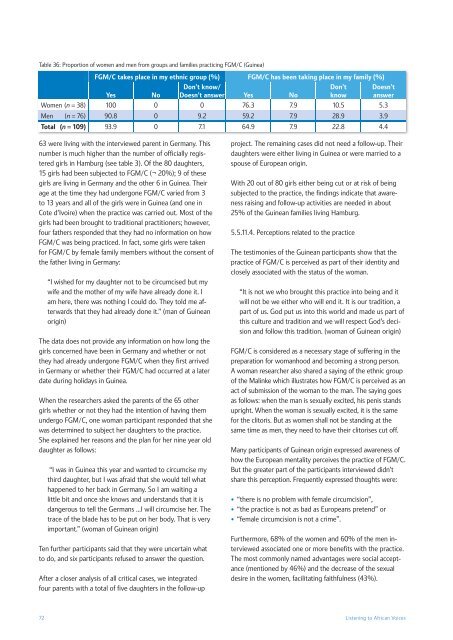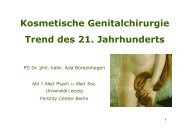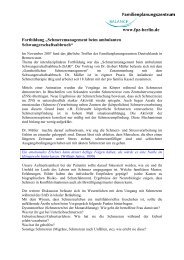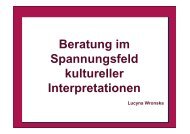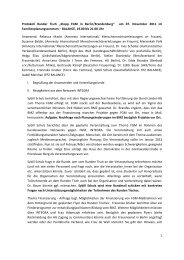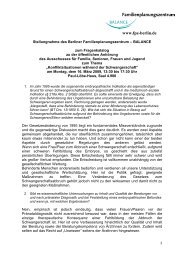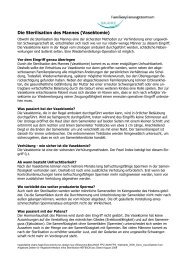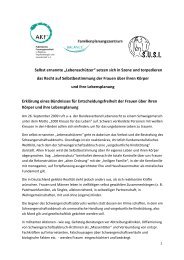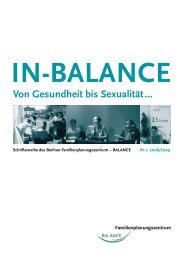Listening to African Voices - FPZ
Listening to African Voices - FPZ
Listening to African Voices - FPZ
Create successful ePaper yourself
Turn your PDF publications into a flip-book with our unique Google optimized e-Paper software.
Table 36: Proportion of women and men from groups and families practicing FGM/C (Guinea)FGM/C takes place in my ethnic group (%) FGM/C has been taking place in my family (%)YesNoDon’t know/Doesn’t answer Yes NoDon’tknowDoesn’tanswerWomen (n = 38) 100 0 0 76.3 7.9 10.5 5.3Men (n = 76) 90.8 0 9.2 59.2 7.9 28.9 3.9Total (n = 109) 93.9 0 7.1 64.9 7.9 22.8 4.463 were living with the interviewed parent in Germany. Thisnumber is much higher than the number of officially registeredgirls in Hamburg (see table 3). Of the 80 daughters,15 girls had been subjected <strong>to</strong> FGM/C (¬ 20%); 9 of thesegirls are living in Germany and the other 6 in Guinea. Theirage at the time they had undergone FGM/C varied from 3<strong>to</strong> 13 years and all of the girls were in Guinea (and one inCote d’Ivoire) when the practice was carried out. Most of thegirls had been brought <strong>to</strong> traditional practitioners; however,four fathers responded that they had no information on howFGM/C was being practiced. In fact, some girls were takenfor FGM/C by female family members without the consent ofthe father living in Germany:“I wished for my daughter not <strong>to</strong> be circumcised but mywife and the mother of my wife have already done it. Iam here, there was nothing I could do. They <strong>to</strong>ld me afterwardsthat they had already done it.” (man of Guineanorigin)The data does not provide any information on how long thegirls concerned have been in Germany and whether or notthey had already undergone FGM/C when they first arrivedin Germany or whether their FGM/C had occurred at a laterdate during holidays in Guinea.When the researchers asked the parents of the 65 othergirls whether or not they had the intention of having themundergo FGM/C, one woman participant responded that shewas determined <strong>to</strong> subject her daughters <strong>to</strong> the practice.She explained her reasons and the plan for her nine year olddaughter as follows:“I was in Guinea this year and wanted <strong>to</strong> circumcise mythird daughter, but I was afraid that she would tell whathappened <strong>to</strong> her back in Germany. So I am waiting alittle bit and once she knows and understands that it isdangerous <strong>to</strong> tell the Germans ...I will circumcise her. Thetrace of the blade has <strong>to</strong> be put on her body. That is veryimportant.” (woman of Guinean origin)Ten further participants said that they were uncertain what<strong>to</strong> do, and six participants refused <strong>to</strong> answer the question.After a closer analysis of all critical cases, we integratedfour parents with a <strong>to</strong>tal of five daughters in the follow-upproject. The remaining cases did not need a follow-up. Theirdaughters were either living in Guinea or were married <strong>to</strong> aspouse of European origin.With 20 out of 80 girls either being cut or at risk of beingsubjected <strong>to</strong> the practice, the findings indicate that awarenessraising and follow-up activities are needed in about25% of the Guinean families living Hamburg.5.5.11.4. Perceptions related <strong>to</strong> the practiceThe testimonies of the Guinean participants show that thepractice of FGM/C is perceived as part of their identity andclosely associated with the status of the woman.“It is not we who brought this practice in<strong>to</strong> being and itwill not be we either who will end it. It is our tradition, apart of us. God put us in<strong>to</strong> this world and made us part ofthis culture and tradition and we will respect God’s decisionand follow this tradition. (woman of Guinean origin)FGM/C is considered as a necessary stage of suffering in thepreparation for womanhood and becoming a strong person.A woman researcher also shared a saying of the ethnic groupof the Malinke which illustrates how FGM/C is perceived as anact of submission of the woman <strong>to</strong> the man. The saying goesas follows: when the man is sexually excited, his penis standsupright. When the woman is sexually excited, it is the samefor the cli<strong>to</strong>ris. But as women shall not be standing at thesame time as men, they need <strong>to</strong> have their cli<strong>to</strong>rises cut off.Many participants of Guinean origin expressed awareness ofhow the European mentality perceives the practice of FGM/C.But the greater part of the participants interviewed didn’tshare this perception. Frequently expressed thoughts were:• “there is no problem with female circumcision”,• “the practice is not as bad as Europeans pretend” or• “female circumcision is not a crime”.Furthermore, 68% of the women and 60% of the men interviewedassociated one or more benefits with the practice.The most commonly named advantages were social acceptance(mentioned by 46%) and the decrease of the sexualdesire in the women, facilitating faithfulness (43%).72<strong>Listening</strong> <strong>to</strong> <strong>African</strong> <strong>Voices</strong>


